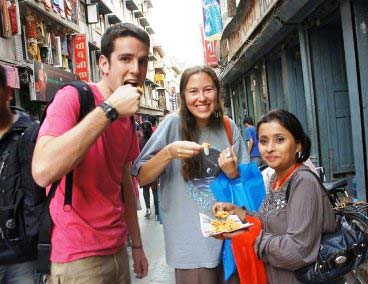Zack works with Youth
Zack, chemistry student at Rice University. Orphanage work in Nepal.
Why Nepal?
I’d done volunteer work in Nicaragua but I wanted to do something else. Africa is kind of “in vogue” these days and I could definitely see myself there someday. To tell you the truth, Nepal struck me as the most random place I could choose, the most different.
 What were your first days in Nepal like?
What were your first days in Nepal like?
I was blown away by everything. It’s a great place and the people are great, but it’s also crazy and chaotic, a lot to deal with at first. Plus, it was my first time traveling alone and that was a little weird, a little scary trying to get around and to figure things out by myself. There was more independence in the program than I expected.
But you adjusted?
Oh, yea. You do get over the “foreigness,” and having so much independence turned out to be great. I would take the local bus everywhere, and started to feel OK. You get stared at a lot in Nepal, but once you realize the [stares] aren’t threatening, that the people are just interested, you start to break your own walls. That was the big experience for me, getting over fears that you might get mugged or something when someone gives you a weird look. Once you get over those initial barriers everything gets much better.
What was your housing like?
I lived in a guest house, in a nice residential area. I had my own room which was much nicer than my dorm room, actually. No air conditioning, but western showers with warm water most of the time, a balcony – really nice.
Let’s talk food. Any adventures?
Oh, yea. I lost 15 lbs in Nepal, because our diet was very starchy, mostly dahl. There was a cook at the guest house – he tried, but some of the food was strange, like, corn flakes with boiled milk. Or once he made pancakes but he left out the eggs. So we ate a lot of peanut butter, bought food in Thamel [popular tourist area] and I ate street food every day, stuff like buffalo empanadas. I made friends with the local street merchants and got great meals for cheap at local mom and pop places.
Did you worry about getting sick?
I definitely could have been more careful, but I never got sick from the food. [Local food] is all part of the experience, you should be there fully.
Miss western food much?
Well, there are, I think, only two chain fast food places in Nepal – Pizza Hut and KFC. When a friend and I got back from spending a week in a village 9-hours out of Khatmandu, we had both for dinner. Had pizza and fried chicken and sodas. It was the best food of my entire life.
Tell me about teaching English at the orphanage.
I have no teaching experience. So the first couple of weeks were kind of hard. The older kids were fine, but the little kids didn’t always pay attention, and I couldn’t talk to them, I couldn’t control them. Sometimes I would just pick them up and move them to their seat. When I didn’t like how the text book presented something, we’d just hang out and talk. I’d ask about their weekend, we talked about favorite foods, we’d draw pictures and label them. I think I was most effective when we were just conversing. There was definitely a learning curve and I left a lot more confident [as a teacher], but I think I ruled out teaching as a profession [laughs.]
You had an eye-opening visit to local hospital.
I’m interested in public health so I visited this hospital that was built in 1890, I think. It was completely run down. [Imagine] the contrast between the sterility of western hospitals where everything is perfect and orderly to this place where everything’s chaotic , the x-ray machine is broken and there’s blood on the floor. That’s the reality of medical care in many countries: you know it’s bad, you know it’s not ideal, but then you see a little boy holding his mother’s IV bag because there’s no IV stand – that’s very striking. That hospital visit was probably one of the most influential experiences of my trip.
Influential? How?
I wanted to find out if I could see myself doing international aid work. And now I think I can. [In college] I’m also studying poverty issues, and it was fascinating to see principles that we talk about in class and see how they play out in real life. In class they seem very straightforward: you do X, Y and Z and fix everything. And then you go to a place like Nepal and see things are a lot more complicated than that – they’re so much more broken than you can ever write about.
Did you feel any reverse-culture shock when you got back?
[chuckling] I did catch myself doing a few Nepali things, like I spit a lot more when I came back, which you really can’t do in polite society.
Looking back, would you do anything differently?
Not much. It was a pretty phenomenal experience, for sure.
To read more about Zack’s adventures in Nepal, check out his fun, well written and picture-filled blog.
More information on ELI's Programs in Nepal.
Zack - Nepal - Orphanage
Interviews
- ARGENTINA - HIV
- BRAZIL - Wildlife
- BRAZIL - Wildlife
- CAMBODIA - Buddhist Monks
- CAMBODIA - Children
- CAMBODIA - Microfinance
- CHILE - Literature
- CHILE - Equine Therapy
- CHINA - Journalism
- CHINA - Urban Planning
- ECUADOR - Medical
- ECUADOR - Teaching
- ECUADOR - Physical Therapy
- ECUADOR - Veterinary
- ECUADOR - Youth
- GHANA - Orphanage
- GUATEMALA - Teaching
- INDIA - Women's Programs
- INDIA - Health & Youth
- INDIA - Journalism
- INDIA - Women's Empowerment
- IRELAND - Art Gallery
- IRELAND - Art
- IRELAND - Law
- IRELAND - Museums
- IRELAND - PR
- IRELAND - Veterinary I
- IRELAND - Veterinary II
- MEXICO - Youth
- NEPAL - Construction
- NEPAL - Orphanage
- NEPAL - Orphanage
- NEPAL - Veterinary
- NICARAGUA - Teaching
- NICARAGUA - Unwed Mother Support
- PERU - Teaching
- PHILIPPINES - Nutrition
- PHILIPPINES - Nutrition
- PORTUGAL - Fighting Food Waste
- PORTUGAL - Housing for the Poor
- SOUTH AFRICA - Public Health
- SOUTH AFRICA - Public Health
- SOUTH AFRICA - Engineering
- SOUTH AFRICA - Nutrition
- THAILAND - Elephant Camp
- THAILAND - Elephant & Medical
- THAILAND - Journalism
- THAILAND - Physical Therapy
- UGANDA - Medical
- UGANDA - Medical
- UGANDA - Medical
- UGANDA - Microfinance
- VIETNAM - Pharmacy
- VIETNAM - Women

